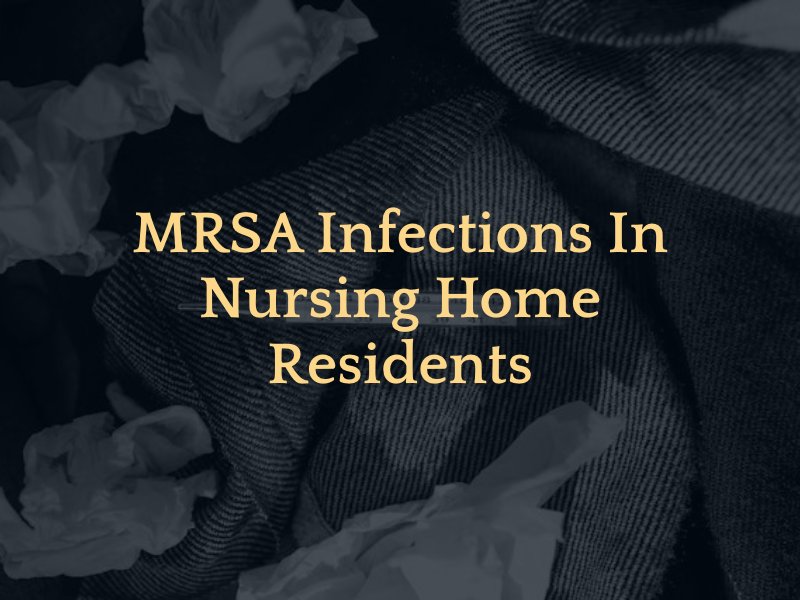
Infections are a common problem in nursing homes, where elderly residents with decreased immunity live together in close quarters. A Phoenix nursing home abuse lawyer can help if your loved one contracted a preventable infection due to negligent care. Staphylococcus aureus (staph) infections are a frequent cause of illness, morbidity, and mortality in nursing homes. While most staph infections are treatable with antibiotics, some strains become resistant to the common antibiotics traditionally used to treat these infections.
Methicillin-resistant Staphylococcus aureus (MRSA) infections resist the medications commonly used to treat bacterial infections, presenting a serious hazard to infected individuals—particularly the elderly with weakened immune systems.
What Makes MRSA Common In Nursing Homes?
When MRSA bacteria colonize a person’s body, the bacteria often persists in its colonization for months or even years. Fortunately, the body’s ability to prevent over-colonization—infection—typically prevents illness from developing. However, the colonized individual may still spread the MRSA bacteria, and sometimes pass it to those with a less robust immune system, resulting in serious illness. MRSA infections are prevalent in nursing homes due to the following:
- Residents with weakened immune systems living together in close quarters
- Caregivers may transfer bacteria from one resident to another or residents spread it in shared living areas
- Many residents rely on invasive devices like catheters, feeding tubes, and breathing tubes
- Nursing home residents often have dry, cracked skin that’s more easily colonized by MRSA
- Nursing home residents are more likely to have pressure wounds (bedsores)
- Nursing home residents are commonly admitted to the hospital and then later returned to the nursing home, sometimes bringing infectious bacteria strains with them, including MRSA
Nursing home negligence may lead to dehydration, malnutrition, and poor hygiene, all contributing to a higher risk of MRSA infections and related complications.
Identifying MRSA Infections In Nursing Home Residents
MRSA infections begin like other staph infections with a red bump like a pimple or boil. As the infection worsens, it becomes larger, more tender, red, and inflamed. As it progresses, it may ooze pus and feel warmer than the surrounding skin. Left unchecked, MRSA infections cause fever, chills, lethargy, muscle aches, rash, and shortness of breath. When a nursing home treats MRSA like a typical staph infection, it often doesn’t respond favorably but continues to worsen.
It’s essential for nursing care staff to promptly and correctly identify any infection developing in a nursing home resident. Immediate aggressive treatment can prevent the condition from progressing.
Complications From MRSA Infections in Elderly Nursing Home Residents
MRSA is more difficult to treat due to its resistance to antibiotics. MRSA may spread to the bone, causing MRSA Osteo Myelitis, a painful condition that limits mobility, destroys bone, and increases the chances of immobility, diminished quality of life, and mortality. It may also invade the respiratory system and cause a life-threatening form of pneumonia that’s difficult to treat effectively. MRSA pneumonia may cause the lungs to fill with pus, restricting breathing ability and effective oxygen transfer, sometimes causing death.
Some MRSA infections spread beyond the original source and enter the bloodstream. In these cases, the infected individual is at risk of sepsis, a life-threatening condition caused by the body’s defense system which triggers a massive inflammation response that can lead to organ failure and death.
How Can a Nursing Home Abuse Attorney Help?
When nursing homes are overcrowded, understaffed, and unhygienic, MRSA infections become more common and less often identified while still treatable in the early stages. Nursing home administrators and caregivers have a legal duty to provide skilled care with respect for an elderly resident’s human dignity. Failing to take all reasonable measures to prevent, identify, and promptly treat MRSA infections leaves the nursing home liable for a victim’s damages, like medical costs, and compensation for pain and suffering. In the worst cases, the facility may be liable for the wrongful death of a resident.
If you or your loved one suffered significant damages from MRSA in a nursing home, call the experienced Phoenix elder abuse attorneys at Knapp & Roberts so we can become a voice for justice in your case.
